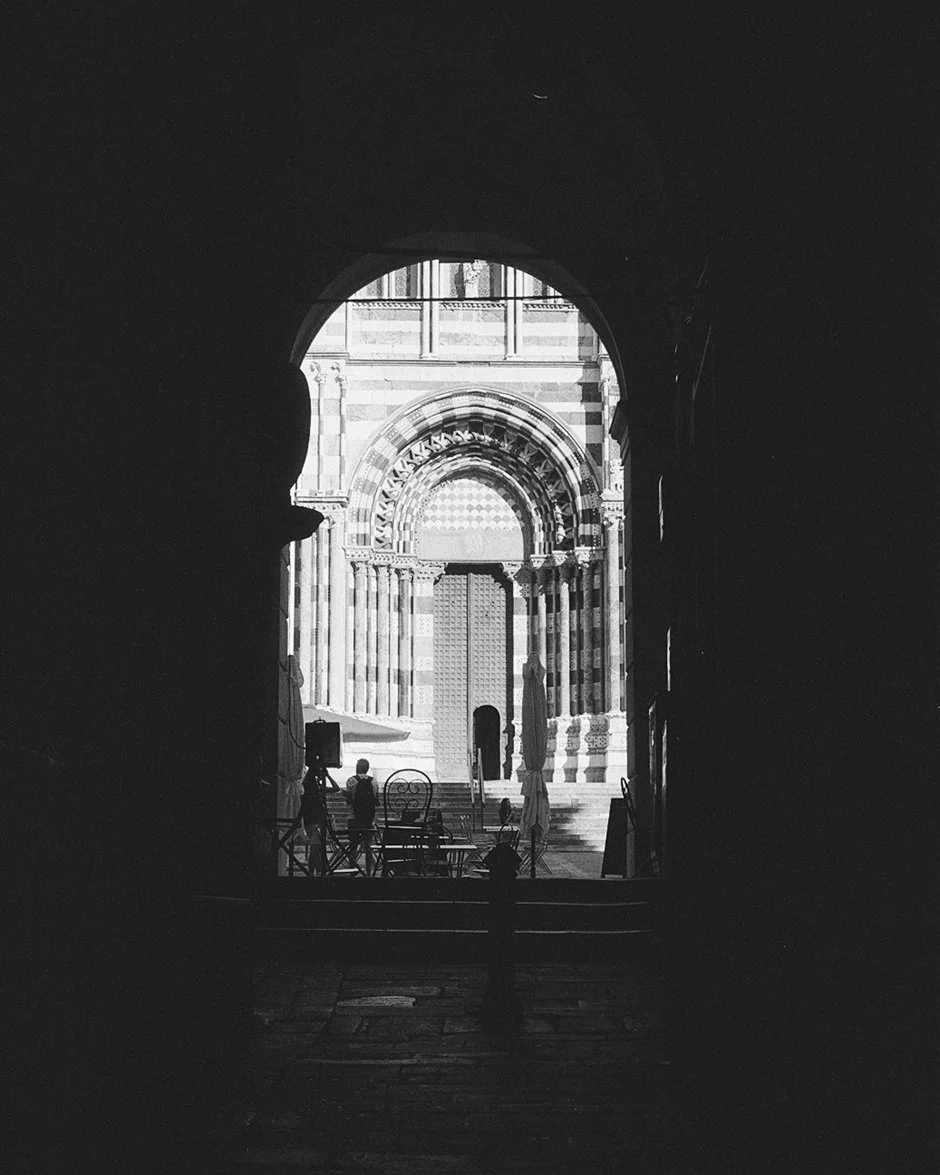Liguria Photo Diary: Genova & Levanto
Cattedrale di San Lorenzo, Nadia Sorabji Stewart (all images author’s own)
Gironzolando per la città storica di Genova, riscontri viste inaspettate, come la vista della Cattedrale di San Lorenzo da un vicolo a sud. Tre grandi palazzi si affacciano sulla piazza San Lorenzo. Credi far parte di una messa in scena di Romeo e Giulietta: da un momento all’altro, un’ombra si staccherà dagli altri e ti affonderà un pugnale nella schiena.
Wandering through the old town of Genoa, you encounter unexpected sights, like this one of the San Lorenzo Cathedral from a passageway to the south. Three huge palazzos face onto the San Lorenzo square. You feel as though you were part of a production of Romeo and Juliet; at any moment, a shadow might detach itself from the others and plunge a dagger into your back.
Vista dall’Ascensore Castelletto Levante
I genovesi vengono chiamati “gli inglesi dell’Italia”, perché si dice che sono chiusi, non sono espansivi, e non si fidano degli altri. Questo stereotipo trova le sue origini nel paesaggio della Liguria, isolata sul lato nord dalle montagne e vulnerabile sul lato sud ai pirati dal mare. Siccome Genova è un porto importante, si può immaginare che i marinai sconosciuti gironzolano per i vicoli. Le case sono arroccate, appiccicate l’una contro l’altra, da cui viene la voglia genovese di occuparsi degli affari suoi. Si dice che a Genova, ognuno vive per conto suo: “ci facciamo i fatti nostri”. Però, questo non si vede dal Ascensore Casteletto Levante. Da lì, a parte le tre grandi gru del porto, la città potrebbe essere una città come tutte le altre. È solo quando scendi dalla collina che scopri i vicoli strettissimi e le schegge di luce che pendono tra gli edifici.
The Genoese are known as “the English of Italy”, because people say they are closed off, by no means outgoing, and wary of others, a stereotype that is grounded in the Ligurian landscape: cut off by mountains on the North and vulnerable to pirates on the South. As Genoa is a vital port, it’s easy to imagine strange sailors skulking in the vicoli, or alleyways. Its houses are perched tightly, pressed up against one another - hence the Genoese desire to keep oneself to oneself. People say that in Genoa, it’s every man for himself: “we mind our own business”. But this isn’t visible from atop the lift at Casteletto Levante. From there, besides the three big freight cranes, Genoa could be a city like any other. It’s only when you come down from the hill that you discover the narrow vicoli and shafts of light which hang between the buildings.
In contrasto, i tetti che lasciano spazio al cielo vasto di Levanto.
By contrast, the rooftops that leave room for the vast Levanto sky.
Levanto, un paesino ad est di Genova, frequentata dai genovesi nell’estate. La domenica, le voci del coro della chiesa si sentono sulla collina.
Levanto (stress the first syllable), a town to the east of Genoa, that the Genoese visit in the summer. On Sundays, you can hear the voices of the church choir up on the hill.
Levanto
Levanto
A Levanto, canoe di vari colori vengono scelte a caso e portate sulla spiaggia, lanciate tra le onde; scorrono sull’acqua fino all'orizzonte, come se avessero raggiunto le navi lontane dalla costa.
In Levanto, canoes of all colours are chosen at random and brought to the beach, tossed into the waves. They slip through the water out to the horizon, as though as distant as the ships far from the coast.
Salumeria
Tornando ai vicoli, si può scoprire una salumeria nascosta, vendendo pesto fresco (bisogna usarlo nei tre prossimi giorni), salumi in varie forme, e strani liquori da cucinare. Ti viene voglia di comprare un po’ di tutto, come se fossi la baronessa Capulet che sparge monete per la città, e certamente non come un turista che ha già speso i soldi dedicati a questa vacanza.
Returning to the vicoli, you might happen upon a hidden salumeria, selling fresh pesto (to be consumed within the next three days), various kinds of salami, and strange cooking liqueurs. You’ll feel like buying a little of everything, as though you were Baroness Capulet sprinkling coins across the city, and certainly not a visitor who has spent all the money set aside for the holiday.






